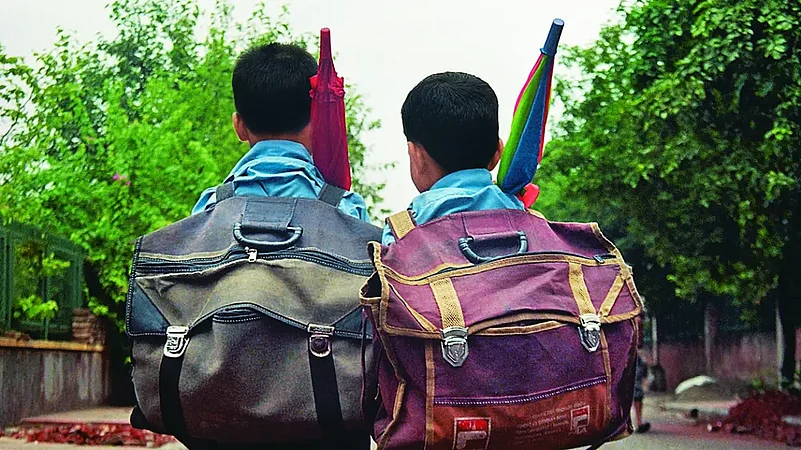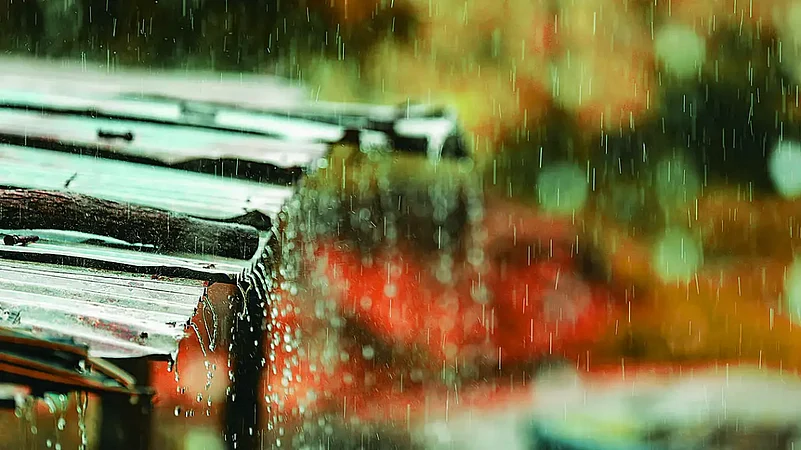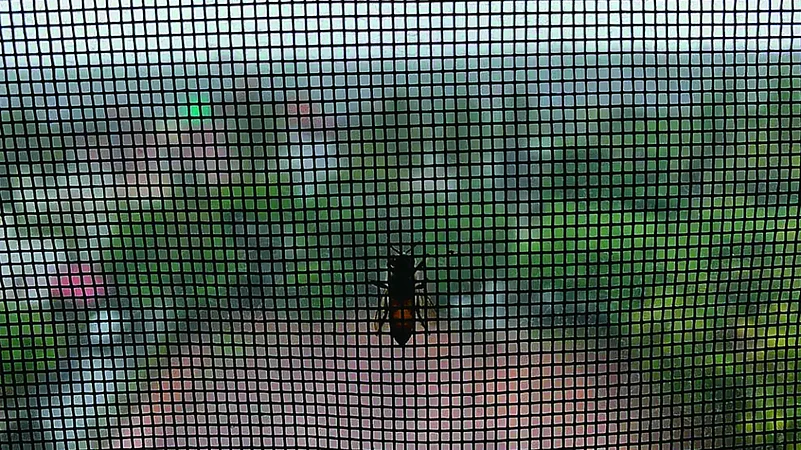It is a scorching May in Delhi. The air is hot and gritty, a napping dragon’s exhalations. Our bodies have become sweat machines. The leaves of the gulmohar have charred at the edges, flowers flaking like cigarette paper in our palms. Suddenly, the sky turns into a chameleon, camouflaging from blue to brown to black, gobbling up the fireball of a sun. A tepid rain soon follows. The soft rumble of rain turns into a sudden pounding—or, perhaps, as Salinger said, falling in buckets…like a bastard. I am stranded in the library, feeling the city pulse with a sudden relief and vigour—skidding bikes, rushing cars, a bunch of people darting towards the shaded chai-tapri.
In the park overlooking the library, I see the straight march of rain bending the spines of grass. The flailing branches of thick-limbed, perennial trees crack with a distinct snap with each mad swirl of the wind. I look at the saucer-shaped nest ensconced on one such branch, the two bluish-grey eggs, the size of cherry tomatoes, tumbling in it. There is life in those small eggs, a strange realisation strikes me. How can life—so robust and tenacious that it would dare to fly in the vast expanse of the sky very soon—begin from such fragility?
Waking up on days when the sky is only curdled clouds, a strange sadness—similar to the mornings of dense, foggy winter days—cloaks me like a blanket. Something begins to twitch inside me. Like a spider suspended on the web with its ropy legs that squirm when you spray Baygon on it. The future would whisper itself in its low baritone in my ears, and despite its various permutations, one thing remained the same—the way the world would stop sparkling in my eyes—when my car would collide head-on with another on the highway, slick with sleet one night, as cars flashing yellow lights would pass by, and leaves would continue to jangle above me, but nobody would be bothered. And, before my flesh would extrude from the skin like the last blob of toothpaste, I would realise that all that was there to earn in this life were the people—and my count is zero.
I would bolt the meshed door overlooking the balcony, paste black charts on bare windows, and take deep breaths while repeating—this too shall pass. I would hurriedly turn on the 100-watt bulb that I had pestered my mom to get installed in my room. My own little sun, I would call it. I would sit in its yellow halo on the ground and close my eyes. I would clutch the pillow tight as if it were my mother’s palms, relieved by an assurance that it could not be snatched away from me.

“Count your blessings,” my middle-aged therapist, whose throat was a jal tarang, would say when I would narrate this incident to her.
“Aren’t blessings things that last?” I would retort, aggrieved by her oft-repeated, simplistic solution. “Nothing that I have will remain. Life will crunch me like Uncle Chipps. The shoulders I will keep my head on will give in. The earth I set my feet on will dip in.”
“But isn’t that the very nature of life?” she would utter, her voice getting stiff as if she didn’t want to stretch it any longer. Then she would give me a diet chart, prescribe an hour-long daily routine of aerobic exercises, and ask me to maintain a gratitude diary.
A close mimic of SAD (Seasonal Affective Disorder), my symptoms resisted any easy labelling. My symptoms were sporadic, always on a rollercoaster of intensity. Some days it would rain, and I felt nothing. Some days, even when it didn’t rain, and the sun shone as if ready to bite, hopelessness would engulf me. Owing to its atypical nature, reaching a diagnosis took a long time. But finding a name for it didn’t help much. There are only assumptions about its patho-physiology—smaller length of days, decreased dopamine and noradrenaline, vulnerability acting at various levels, genetic susceptibility, etc.—and thus, only blanket drugs like antidepressants to treat it.
Instead of medication, my therapist suggested therapy. She encouraged me to talk freely about anything that came to my mind. After a few sessions, a pattern emerged—that after talking for the first few minutes about the current day, I would talk about the helplessness that came along with the bullying at school. The rains, she said after a month had passed, are not the real trigger. Or even the act of raining. Rather the swiftness with which rains hijack the light of day.
She said I liked the jarring staccato of summers because light has been culturally associated with a sense of safety and certainty. The history of mankind is the history of finding light to combat the devil of darkness.
Saand, bhains, genda—students greeted me as soon as I entered the class. When I tried mocking their surnames or picking at some of their strange habits, the rough-and-dark-skinned Jat boys with spiked hair would circle around me and threaten me with their fists, “Jyada uchhal raha hai chhokre. Saari akad kaad denge. Aur kisi ko bola toh pata hai na.” They hit me with small balls of foil and leftover pieces of chalk the whole day. At night, they populated my dreams, their eyes shining like jackals in anime films.
Once, during lunch break, Satbir, who wore zero-power spectacles to look studious and impress girls, came from behind me and squeezed my breasts as if they were stress balls. It was a dare. The whole class burst into laughter. I ran away, my heart pounding, my forehead sweaty. The queasy, uncomfortable feeling at the bottom of my stomach left me only after I reached home.
I decided to be tight-lipped about those incidents at school. I feared a fate similar to Rohan—the lean and quiet Nepali boy with a face so expressionless as if carved out of wax—who would sit in the extreme right corner of the library, hunched over his yellow, moth-eaten copy of Ulysses. He reported the Jat miscreants’ deeds to the principal: how they forced junior boys to do their projects and beat them black and blue if they refused. But when representatives of the juniors were summoned to testify at the block in-charge’s office, they denied it.
Instead, they reported to the Jat gang about Rohan. Furious, the gang caught hold of him in the washroom. One of the taller boys unlatched the door of the cubicle he was occupying. Rohan, sitting hunched on the Indian commode, trying to pass urine, got caught off-guard. He tried to close the door, but the grip of his shaky, sweaty hands was quite feeble compared to theirs. They clicked his photos and circulated them in the batch group.

He had no penis, only a bulge between his thighs. The news spread like wildfire. We were shocked. We talked about it during the assembly, the recess, while sitting in the school bus. How was that possible, we wondered. Hijra, chhakka, kinnar—students in his section wrote on the desks with their whiteners. We were inundated with mythical stories about transgenders—that they are messengers of God; that they can never bear children; that sleeping near them can cure even the deadliest of diseases. Our mouths split wide in amazement. But we were scared too. We greeted the Jat gang by bending down. We offered them our seats on the bus. We promised them we wouldn’t divulge anything.
The principal condemned the act while addressing the morning assembly. Our parents were assured that the situation was under control. But Rohan went missing. He returned after a week but only to take a school-leaving certificate. He was admitted to a boarding school and went away to a newer city never to return.
That day I took a longer route to meet him while returning home. The house was particularly silent, except for the ashoka tree swaying in the bluster. When I was about to leave, he came out of the house into the garden. He liked gardening—he would bring a sprig of mint or a bunch of jasmine flowers to school in a tin box. He would hold them like a trophy, even smell them after the end of every class. That day, in his brown chequered knickers, he plucked each flower with a rash, quick movement of his hands, and trampled the bunch under his feet. Afterwards, he cried bitterly for a long, long time, as if a cloud had burst inside his eyes.
I stood there for a long time but couldn’t dare go near him. My chest was heavy with guilt. I felt I had wronged him. After coming home, I filled colours in a python—that sinuous, slender, spotted snake I had never dared to colour in my pre-school colouring book earlier. I watched a YouTube video about how snakes kill their prey. I saw a beige snake coiling around the body of a forest officer in a green raincoat. The mixed sounds of splintering bones and shrill cries persisted for brief moments, after which stillness prevailed. I thought of the person shooting the video, who didn’t even attempt, no matter how futile, to save that man. The same way as Rohan had called me the day after the incident, but terrified that I would draw the ire of the Jat group, I had silenced the call.
The rain topples the nest like an angry husband flinging the dinner plate because of inadequate seasoning. The eggs tumble down the wet patch of grass under the tree. One of them disappears in the soil slurry, another rolls over some distance on the footpath, before resting on it. The rains calm down abruptly. People disperse from the tapri, one of them hurriedly stepping on an egg. He realises it, even lifts off his chappal to look at the long string of yellow albumin, but unbothered, walks on. On my way back to the hostel, I wonder if it was good that the eggs got crushed, that it wouldn’t have been worthwhile for the pencil-necked hatchlings to survive and watch derelict landscapes of life, and later, get picked up by the hawks.
They say that the slow simmer of pain makes you resilient from inside. Like the tree when pruned over and over again spreads swifter and grows taller. But the lute of the body has to bear the brunt, its wires bowed and crooked, slowly giving way. Our bodies, delicate like eggs, are stepped over sometimes by life, sometimes by people whose hearts we thought were like glowing lanterns. Pain, the way our bodies manifest this anguish accrued over the years. Pain, we have to ignore every passing day.
(Kinshuk Gupta is a Delhi-based freelance journalist who writes on culture, gender, and education. Views expressed are personal)
(This appeared in the print edition as "When Rains Don’t Heal")

























